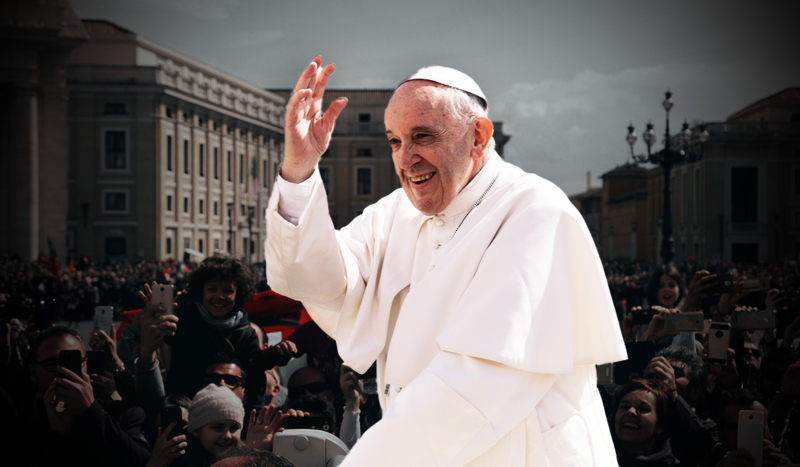
CV NEWS FEED // Protestants’ perspective on Catholicism as a “resolute” guardian of traditional Christian beliefs have begun to shift under the pontificate of Pope Francis, who is “perceived as a liberal,” argued the president of the Conservative Institute on Religion and Democracy (IRD).
In his January 4 article for the popular evangelical blog “Juicy Ecumenism”, IRD president Mark Tooley expressed concern that the liberal-perceived pope’s pontificate may endanger relationships between conservative American protestants and Catholics, and that “it would be unfortunate” if this causes a reemerging of the “anti-Catholic prejudice” of traditional American Protestantism.
Recalling the pontificates of John Paul II and Benedict XVI, Tooley wrote, “While much of Mainline U.S. Protestantism was liberalized and emasculated, and much of conservative Protestantism lacked a strong intellectual tradition and compelling public witness, Catholicism under those popes seemed resolute and imposing.”
“Under Pope Francis, this perspective has changed,” Tooley continued. “He is of course perceived as a liberal Pope who is adapting the church to Western social preferences.”
Tooley noted that Francis’ “new statement on blessing same-sex couples does not change Catholic teaching about marriage and chastity,” but “it does create confusion in public perceptions.”
Francis’ “moving the church away from Just War teaching, definitive rejection of capital punishment even in theory, and his 2015 Laudato Si’ encyclical’s environmentalist and economically statist themes have solidified his progressive reputation with conservative critics,” Tooley continued.
Catholics who “speak about schism, question Francis’s legitimacy as pontiff, or even pray for his earthly departure” have been “surprising” to Protestants, Tooley explained. “Many Protestants, in their caricature of Catholics, have imagined that the papacy, with its ‘infallible’ authority on faith and morals, is sacrosanct and immune from critique.”
Tooley noted that liberal “U.S. Mainline Protestantism” is on the decline, a point he had explored more extensively in a previous article. When this decline began, Protestants needed to turn to the Catholic intellectual tradition for help in arguing their beliefs, Tooley explained.
“The collapse of U.S. Mainline Protestantism also included a collapse in Protestant confidence, intellectual life, and public influence,” he wrote:
Modern Evangelicalism lacked the institutions and traditions of centuries-old Mainline groups. They typically could not compete directly with vigorous Catholic intellectual life. And so rising Evangelicalism often relied on Catholic intellectual resources to make needed public arguments.
Over time, this shift helped foster positive relationships and dialogue between Protestants and Catholics. “We rightly celebrated increased collaboration between Protestants and Catholics, and the decline of old prejudices that previously had divided them,” Tooley wrote.
“Pope Francis has disrupted this narrative. Will parts of Western Catholicism now shift towards the liberalism of Mainline Protestantism? Is it now fair to compare Francis to an Episcopal Church bishop?” he questioned:
No, that comparison is not fair. The Catholic Church remains rooted in its historic teachings in ways not true for much of Mainline Protestantism. Catholicism’s centuries of history, and its universality, prevent its full accommodation to contemporary Western culture.
But the spirit behind much of the Francis pontificate has persuaded many conservative Protestants that the Catholic Church is no longer a reliable guide and partner on key moral issues that had been true under the two previous popes.
“It would be unfortunate, if in reaction to Francis, historic anti-Catholic prejudice reemerged among many conservative American Protestants,” Tooley wrote, arguing that “Catholicism offers a treasury of ethical and spiritual resources that are indispensable to global Christianity.”
“Protestantism, least of all U.S. evangelicalism, cannot alone offer what is needed spiritually and ethically in our world today. And half of global Christianity is Roman Catholic. The leadership of those hundreds of millions will always be very important for global Christianity and for the world as a whole,” he wrote.
He added that Protestants “cannot expect that the Catholic Church, unlike Protestantism, is monolithically immune to cultural trends,” and that “no branch of Christianity is immune… to the human condition.”
“Protestants obviously have a different understanding of church and authority than do Catholics. Both can trust that the Holy Spirit will always ensure the Gospel’s propagation,” Tooley concluded:
And neither should exaggerate the moral reliability of their ecclesial structures or leaders. Even sanctified saints at their best can be confused and, at times, highly unreliable. At best, and with time, the collective’s wisdom will providentially overcome the mistakes of the particular.

